Sergio Chodos – Argentina’s representative at the International Monetary Fund, the right-hand man of Economy Minister Martín Guzmán and a key negotiator with the multilateral lender – explains in detail how the agreement was reached, anticipating some of the fine print and unfolding the government’s economic vision.
Politically correct within Frente de Todos, he lays his bets on Congress approval.
You said that the Fund is worried by Máximo Kirchner’s decision. Is that really so?
I didn’t say that the Fund was “worried” but paying attention. The need for Congress intervention was an idea of Alberto Fernández. Doing that from here on in Argentina means a deeper debate involving society more in the agreements with the IMF, including all generations. Congress participation is a fundamental link for concluding an agreement. I said that it was being watched with “attention,” not concern.
Ex-deputy Fernanda Vallejos said: “They’re lying to us. [IMF chief] Kristalina Georgieva speaks of structural adjustments being agreed for further down the road.” Do structural adjustments further ahead come into the negotiations with the Fund?
No, but there are structural policies permitting us to attack endemic problems such as, for example, the external restriction of our chronic lack of dollars. The more we grow, the more we need dollars – especially if our positive balance of payments shrinks – and the greater the potential for strangulation. We have often seen that in our history. There will be work towards improving tax administration, wising up to evasion, and towards boosting added value and boosting Argentina’s export potential. That all forms part of the structural challenge, over and above the programme with the IMF.
But will those be autonomous decisions taken by Argentina?
They are decided by Argentina. Some of them are enshrined in the agreement, such as, for example, the improvements in tax administration.
Juan Carlos Torre, in his book Diario en una temporada en el quinto piso relates that in Raúl Alfonsín’s stand-by loan the fiscal deficit agreed was publicly presented as 2.7 percent of Gross Domestic Product when the IMF document had it at two percent. Would that be possible today in the age of the Internet?
It would be possible whenever there is no firm political decision as to how to negotiate and whenever the objectives are unclear.
I’m referring to informing about something different from reality.
But that has to do with the methodology of working behind society’s back with unclear priorities. The current programme provides for a scenario of increased spending in real terms. It’s fundamental to shoot for growth, both of economic activity and of the export and consumer sectors, thus lowering the banking arrears even more for a greater credit expansion. The most important thing is to go to Congress with the IMF programmes in the understanding that they are the programmes of Argentina as a whole. We talked about that in a previous interview – the need to be aware that we share a common space. We are a nation-state. We have to concentrate and think of ourselves that way, incorporating an analysis of both the present and the dimensions of the future. It is fundamental for any agreement to be accompanied by a social awareness that all of us must comply. Those are the goals we must reach but not because something different was fixed under the table and we’re heading for austerity. No, in this case we’re moving towards a fiscal consolidation which is the child of growth. It happened in 2021 – we had far less primary deficit than estimated. So was primary spending cut? No. It grew more than projected and we could boost that growth. The logic is a joint decision defended jointly.
Kristalina Georgieva has said: “Our main focus is pulling Argentina out of this very dangerous path of high inflation.” Does inflation come first for the IMF?
For the IMF many problems are central for sure, such as the fiscal road map and the accumulation of reserves. What seems interesting to me from what was said, which correlates with our work of the past two years, is the understanding of the IMF regarding the motor of inflation in Argentina where there has been a change. Inflation is now understood as a multicausal phenomenon. There is the monetary dimension but also others. That is where voluntary price agreements come in. That did not happen before. That forms part of the process of understanding and sharing analytic information over these last two years.
Was this change also reflected in the IMF agreement with Iceland, where capital controls were permitted?
There is also a role for capital controls. The IMF did its own internal audit published on December 27. It’s not ours – our vision is even more critical. But there are points of contact in the analysis. One is the major error of not having installed capital controls in the 2018 programme. IMF thinking on what happened and its understanding of Argentine economic reality is evolving.
Kristalina Georgieva used the expression “pragmatic plan”. When she says “pragmatic,” does she really mean “heterodox”?
What must predominate is realism and the capacity of this programme to be feasible and not go off the rails as in 2018 or 2001 or the 21 programmes with Argentina with the same logic of austerity while opening up the economy indiscriminately. A programme adjusted to Argentine realities which works.
Would it be correct to term this extended fund facility agreement as temporary and that the government taking over in 2023 will have to renegotiate it?
It does not seem that way to me. Let’s retrace some ground a bit. We have a stand-by agreement which was an important historic error. The 2018 agreement left us Argentines with nothing, just a debt with a privileged creditor. The extended fund facility agreement into which we will be entering aims at beginning to emerge from that swamp. An extended fund facility means that we start making capital payments in a period between four-and-a-half and 10 years. But since reimbursements were made in this period of 30 months with 10 quarterly reviews, we’ll be paying the last instalment of the extended fund facility not in 10 years but 30 months later or in 12-and-a-half years.
So 12-and-a-half years instead of 10?
From end to end. The capital on each remittance is paid within a period of between four-and-a-half and 10 years, in 12 quotas twice a year with the last coming after the last review. This is the first reimbursement with each review being preceded by a remittance. The last capital payment also falls within this scheme.
So has the 10-year deadline been stretched out yet further
There is a span of 10 years for each reimbursement. Since the remittances do not come at the same time, there are 30 months between the first and last. Each one of those remittances is repaid within four and a half and 10 years.
When will the last payment be made?
In September, 2034, if granted next month. The first reimbursement comes with the signature of the agreement, followed by every review for the next 30 months.
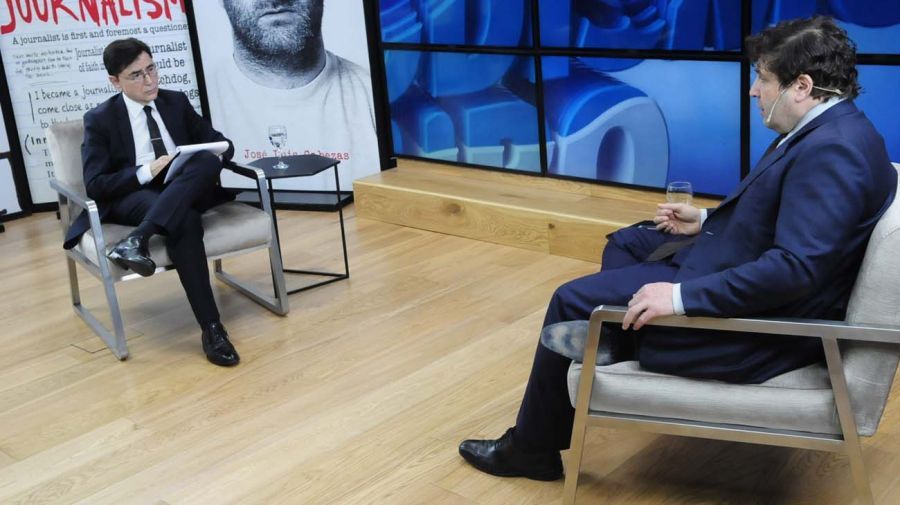
It might seem clearer to say that the 10 years from today end in March, 2032 and finally in September, 2034, 12 and a half years later. Does the IMF propose making various taxes more progressive, as well as creating wealth taxes and levies on idle assets?
What we have at this moment is an agreement on tax administration. We have to improve that administration and combat evasion.
What would that mean in concrete terms?
The focus here is not on inventing new taxes but on fighting inflation and evasion.
Wouldn’t making taxes more progressive imply new taxation without modifying the system?
That’s not what we are discussing at the moment.
Independently of the word “lying” used by ex-deputy Vallejos, how much truth is there in the repeated rumour that you and Guzmán are hiding information on the negotiations from the political leaders of the coalition? I ask assuming that not infrequently the task of the negotiator is to filter the information and not give it all in order not generate unnecessary reactions to things which afterwards do not happen.
It’s Martín who has to carry on the dialogue with Frente de Todos leaders. I know from experience that he has a great capacity to explain and transmit the essential elements and variables.
Last year energy subsidies consumed US$10.7 billion, equivalent to 70 percent more than the previous year. The IMF’s second-in-command Gita Gopinath has highlighted the importance of reducing subsidies. What does the agreement supply in that respect?
We’re working on a scenario of segmentation. A lot of work is being done by technicians from both the government and the energy sectors. The important thing is to understand that whoever receives a subsidy needs it and has a right. There are many users who do not need it and it is unfair that they should be receiving a subsidy. This is an issue of fiscal viability. The most important work is having a map and scheme of segmentation which permits the problem of excessive subsidies to be solved while guaranteeing the corresponding rights where they are due.
Would that imply the consumers who do not need subsidies because their socio-economic level is above a certain range would be facing an increase double the inflation figure?
I’m not a technician in that line of work. What I would say is that those users will not be having a free ride which they do not need at everybody’s expense.
In last Sunday’s interview with [Central Bank Governor] Miguel Ángel Pesce, we touched on the issue of reserves. What can be known about them today?
That’s important in the sense of showing signs of strength. In a context like the present with the upheavals which Argentina has had, what is needed is strength. One of the central problems of 2018 was the misuse of IMF funds, playing the exchange market and facilitating capital flight. Apart from repaying the organism, we have to boost Argentina’s reserves for the success of the country and of the programme. We also have to clarify and guarantee. This is not a government nor a programme thinking of the reserves as part of the exchange market game nor for guaranteeing anybody’s exit. In the context of giving signs of strength, boosting the reserves is important. It’s not about guaranteeing anybody’s flight.
How much will this year’s reimbursements be and when will they come?
They would come before any obligation to pay. The first deadline is next March. The reimbursements would come amid the finalisation of the Staff-Level Agreement with the approval of Congress and the IMF board of directors. From that point their implementation would be cleared.
And what would the dimensions be?
At least the same as the payments of 2020 and 2121.
Would the US$3.8 billion already paid be rapidly recovered?
That’s the issue of how we distribute the size of the exposure of the previous programme, which will be the size of this new programme. The level of strength and accumulation of the reserves required is still under discussion. How much more than the next payments the initial reimbursements will need to be forms part of that. That’s why it is so important to focus and calibrate well the strongest needs to boost our reserves.
But concretely what would be the time range in which Argentina will be recovering what it paid?
We have to close the technical discussion over this issue. Obviously the reimbursements will be greater than the payments to come.
Will we progressively be receiving a bit more than each payment, once what has already been paid is recovered?
Up to some point at which that will start to be turned around.
Martín Guzmán stayed behind in Moscow. Was his motive chasing Russia’s special drawing rights? What would that mean for Argentina’s reserves?
The idea of the importance of multilateralism is crucial, developing good relations with all the countries which can help us grow and have aggregate demand, exports and investments. You have to have an overall perspective of our interests, making smart linkages with the world and beginning by understanding that international relations are not a zero-sum game. What does agreeing with the IMF mean? Agreeing with the United States, agreeing with Japan, with China, with Germany, with France, with Italy, with Britain, with Brazil and with the rest of the countries because that’s the IMF, it’s a community of interests. To agree with the IMF is to agree with the United States, China and Europe.
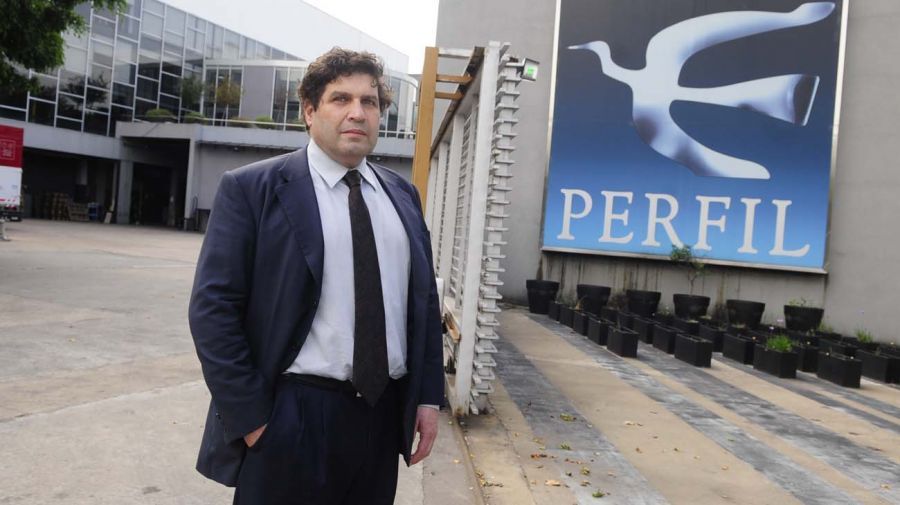
Last Wednesday you met the Senate Majority Leader José Mayans. Did he guarantee Senate approval of the agreement with the IMF?
It was not up to me to ask that nor up to him to guarantee it. It was a very good meeting. It’s fundamental to have many channels of dialogue. Mayans is a very important figure with a great track record and plenty of experience of crises and solutions under his belt. He’s also a person with plenty of political dialogue.
Did that interview leave you optimistic as to Congress approval?
It left me with an understanding outlook and a very clear commitment.
Does [Santa Cruz Province] Governor Alicia Kirchner saying: “I celebrate the agreement obtained by Alberto Fernández to permit growth and continued economic revival” allow conjecture that Máximo does not respond to hardline Kirchnerism or all his family?
It’s not up to me to speculate. What I am going to say is that it seems to me that there is plenty of overlap even with Máximo’s outlook. None of us want the IMF in this country or celebrate that we have to undergo this agreement. That the governor understands that this is the beginning of a way out has its value. You have to think that if all this turns out well – and I think it will – in September of 2034 we’ll be able to emerge from the morass we entered in 2018. For our political force this exposure to the IMF runs counter to our natural values.
Are you making a distinction between what the Fund was and what it is now?
There was a process of understanding and mutual apprenticeship, perhaps from comprehending the distinguishing features of Argentina – which ways out are possible and which not. The audit of the 2018 programme, which is not even very deep and with which we have some important differences, is a valuable exercise. This discovery regarding Argentina’s tolerance for debt is not the same as for other countries. That identification that inflation is multicausal, that clarity as to a record monetary contraction not working when interest rates are running at 80 percent. Also understanding that voluntary agreements are part of a holistic attack against inflation.
Regardless of having followed the timetable, because the most significant reimbursements were in 2022, would a faster agreement, ahead of Covid-19, have been worse for Argentina?
The agreement does not depend on the when, it depends on the how and the what. It must guarantee that Argentina can continue growing in real terms.
Did coronavirus soften up the Fund?
It gave it other perspectives. I don’t like using the phrase “soften up.” It made it adopt other positions.
Some weeks ago all the talk was of the distance from any possibility of agreement with the Fund, all the commentary was pessimistic and all of a sudden there was agreement. Was the previous analysis misinformed or were there new developments to trigger the agreement?
I did not feel there were any U-turns, more the culmination of consistent work to arrive at a determined meeting-point. I don’t have that feeling but I understand it. From the outside or a media standpoint it might seem like to-and-fro but that was not my experience.
Did Kristalina Georgieva really call Alberto Fernández to tell him: “Now is the time”?
On January 7 it began to be clearer to us that there was goodwill to start moving but it was also the fruit of incremental work. [Editor’s note: On January 7 Alberto Fernandez was elected the president of the Community of Latin American and Caribbean States, or CELAC in its Spanish acronym].
Banco Nación director Claudio Lozano said that this agreement implies the reduction of the deficit to approximately US$9 billion.
I’m not going to discuss the numbers. I’ll only say that austerity is when you make cuts and spend less in real terms than the previous year.
So with the same spending as last year updated to inflation, would economic growth permit that 0.8 percent [of GDP] deficit reduction to be met without austerity?
That would be pretty similar to what happened in 2021.
But wouldn’t that path turn more complex in 2023 as an electoral year?
2023 will be less demanding than 2022, having had two consecutive years of important growth.
Why less demanding?
Because the gradient to 1.9 [percent of GDP] is less than 2.5.
Lowering 0.6 percent as against 0.8 percent the previous year?
Less with respect to the base because proceeding from greater growth.
Is it an error of the opposition to think that there should be more austerity now and not in 2024?
The fiscal path provides for 0.9 percent [of GDP reduction] for 2024. And we won’t seal the deal until we’re also guaranteed the possibility of increasing spending in real terms in 2024. It’s not about reaching 2023 at any price.
I was asking about a possible conceptual error of the opposition. Should they reach government, wouldn’t it be better to have a country with a higher GDP in 2024?
That would be speculating beyond what the challenge requires. This seems petty-minded to me, lacking perception of the good of the whole, attaching excessive importance to the present, to groups and to egos. It seems like a lack of vision to me.
Would more austerity in 2022 and 2023, even with economic shrinkage for 2024, increase their electoral possibilities?
The best thing for the opposition would be a country in the best possible condition and with the greatest margin for manoeuvre possible. I believe that a country with the greatest degree of freedom to govern is always the best.












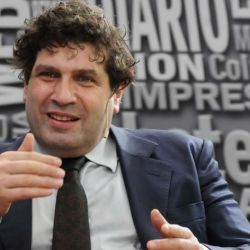





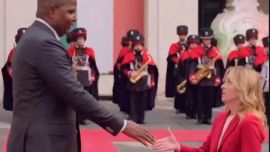












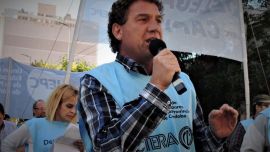
Comments